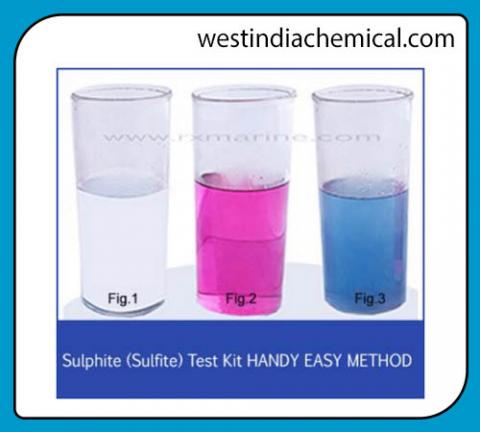Primary tabs

Sulphite (Sulfite) Test Kit HANDY EASY METHOD
SKU::RXSOL-62-5503-001
Dose of Sulfite can be controlled by this method ::: Because it readily reacts with oxygen to form sulfate, sulfite is not usually found in natural water systems. In its most common form, sodium sulfite, it is widely used as an oxygen scavenger in feedwater conditioning to prevent pitting in boilers; as a pulping or pulp-bleaching agent by the paper industry; to neutralize residual chlorine in potable water, sewage, industrial effluents, and textile process waters; and as a reducing agent in still other manufacturing processes.
Sample water over 100°F will cause a false-high reading; therefore, quickly cool to room temperature before testing. To prevent a false-low reading caused by the reaction between sulfite and ambient air or dissolved oxygen, water samples should be capped while cooling and then tested without delay. An iodometric drop test is the most popular field method for determining sodium sulfite concentrations.
Reagent packs, containing an instruction and chemicals only, may be purchased for use with buret setups. Note: Sulfide and ferrous iron cause positive interference; copper and nitrite cause negative interference.
Sulfite, Titrimetric Method(0-100ppm)
The test for sulfite is based on the colour change end point reaction. At the end point reagent combines with the indicator to form a blue color.
Apparatus Required
Buret, automatic, 25 ml - 1 ( Sample Tube, Graduated, 25 mL, plastic w/cap and white dot )
Casserole porcelain, 210 ml - 1
Cylinder, graduated, 50 ml - 1
Measuring dipper (plastic) - 1
Stirring rod, glass - 1
Chemicals Required
TK - 13 ::: RXSOL-62-5503-002
TK - 14 ::: RXSOL-62-5503-003
TK - 15 ::: RXSOL-62-5503-004 ( 1 ml =0.5 mg SO3 )
Procedure for Test
The water sample should be freshly obtained with as little contact as possible with air. Do not filter the sample, but cool it to room temperature (70 to 800F).
NOTE:
Sample must be cooled to less than 100ºF (38ºC) to prevent high test results.
Sample must be protected from air contact while cooling to prevent low test results.
1. Measure 50 ml of the water sample with the graduated cylinder . For error free result Collect water to be tested in a clean, preferably large-mouthed, bottle to overflowing. Immediately cap and cool to room temperature.
2. Add three or four drops of TK - 13 ::: RXSOL-62-5503-002 to the sample Swirl to mix. Sample should turn red.
3. Add TK - 14 ::: RXSOL-62-5503-003 Powder a dipper at a time, swirling after each dipper, until color changes from red to colorless. Add 2 more dippers. Swirl until dissolved. ( Note : Use the plastic dipper to add TK - 14 ::: RXSOL-62-5503-003 to the sample. Add only one measure at a time and stir thoroughly between each addition of TK - 14 ::: RXSOL-62-5503-003. All the particle of TK - 14 ::: RXSOL-62-5503-003 may not dissolve and this may create a slight haze in the sample. Continue to add the TK - 14 in this manner until the red color disappears. It is not necessary that the sample solution be exactly neutralized, only that the sample turn colorless. When the sample is colorless, add one additional measure of TK - 14 ::: RXSOL-62-5503-003 and stir. )
4. Add TK - 15 ::: RXSOL-62-5503-004 Reagent dropwise, swirling and counting after each drop, until color changes from colorless to a faint but permanent blue. Always hold bottle in vertical position.
This color change is taken as the endpoint. Record the ml of TK - 15 ::: RXSOL-62-5503-004 solution used.
Calculation of Results
FORMULA: ppm sulfite as SO3 = ml of TK - 15 ::: RXSOL-62-5503-004 x 500 / ml SAMPLE
Using a 50 ml sample, sulfite, in parts per million as SO3 is equal to the ml of TK - 15 ::: RXSOL-62-5503-004 required multiplied by 10.
Limitations of Test :::
This method is rapid and adaptable to field determinations. It is affected by any oxidizable substances in the water such as organic matter sulfides and nitrites. The presence of these interfering substances will cause the sulfite content obtained from this titration to by shown as a higher value than actually exists.
Interfering substance
Interference level Metals Some metals, especially copper, catalyze the oxidation of sulfite to sulfate. Immediately add TK - 14 ::: RXSOL-62-5503-003 powder for each liter of sample during sample collection to prevent the interference.
Nitrite Reacts with sulfite and causes low results.
Organic compounds Oxidizable organic compounds can cause high results.
Oxidizable compounds Cause high results.
Sulfide Causes high results.
Sulphite (Sulfite) Test Kit HANDY EASY METHOD manufacturer supplier distributor in Mumbai, Kandla, Kolkata, Vizag, Chennai, India, Fujairah, Dubai UAE, Muscat Oman, Kenya Africa. Get the best quality of Sulphite (Sulfite) Test Kit HANDY EASY METHOD at a competitive price from us. We have ready stock of Sulphite (Sulfite) Test Kit HANDY EASY METHOD in India, UAE Gulf, Oman, Kenya Africa. Contact us for bulk as well as small orders.
Samples must be analyzed immediately after collection and cannot be preserved for later analysis.
Let the sample temperature decrease to 50 °C (122 °F) or less before analysis.
Sulfite reacts quickly with oxygen in the air. Shaking or swirling the sample causes low results. Prevent agitation of the sample during the procedure.
Review safety chemical handling procedure. Use the recommended personal protective equipment. Dispose of reacted solutions according to local, state and federal regulations. Follow the environmental safety, health safety staff for your facility and/or local regulatory agencies for further disposal information.




